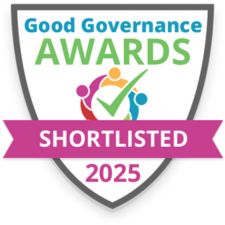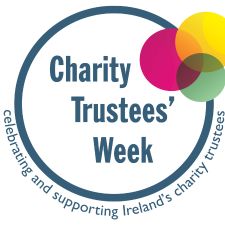The winners of the Carmichael Good Governance Awards 2025 will be announced at our Awards Ceremony on November 19th.
Book your free ticket here!
This year, 122 nonprofit organisations entered their annual reports into the Good Governance Awards. The awards are divided into 7 categories based on the annual income of the organisation.
The winners will be announced at the Awards Ceremony which will take place from 5.30pm to 8pm on November 19th in Chartered Accounts Ireland (House, 47-49 Pearse St, Dublin 2, D02 YN40, Ireland).
Book your free ticket here!
Well done and good luck to the shortlisted finalists:
Category 1: for organisations with an annual turnover of less than €100,000.
Chronic Pain
Dark Sky Ireland
Niteline
Category 2: for organisations with an annual turnover of between €100,000 and €250,000.
Kilkenny Volunteer Centre
Louth Volunteer Centre
Parentline
Wexford Volunteer Centre
Category 3: for organisations with an annual turnover of between €250,000 and €750,000.
Suas Educational Development T/A STAND
Breaking through CLG
Irish Development Education Association
Category 4: for organisations with an annual turnover of between €750,000 and €2.5 million.
Spraoi agus Spórt
Belong To LGBTQ+ Youth Ireland
Outhouse LGBTQ+ Centre
AHEAD
Marie Keating Foundation
Category 5: for organisations with an annual turnover of between €2.5 million and €10 million.
National Adult Literacy Agency
Womens Aid
Early Childhood Ireland
The Jack and Jill Children’s Foundation
Category 6: for organisations with an annual turnover of between €10 million and €50 million.
Kare – Promoting Inclusion for People with Intellectual Disabilities
Irish Cancer Society
LauraLynn, Ireland’s Children’s Hospice
Barnardos Republic of Ireland
Oxfam Ireland
Category 7: for organisations with an annual turnover of over €50 million.
Cluid Housing
Focus Ireland
GAA
Goal
Rehab
Charity Trustees’ Week 2025 will run from November 10th to November 14th with 12 events for Trustees.
Carmichael’s event:
Recruit, Retain and Reap the Rewards – Wednesday November 12th at 10.00-11.30am with The Wheel (Free, online)
- Sign up here.
For the full calendar of events and booking links see here.
Charity Trustees’ Week is hosted in partnership by the Charities Regulator, Boardmatch Ireland, Carmichael, Charities Institute Ireland, Dóchas, Pobal, The Wheel, and Volunteer Ireland.
As well as celebrating the work of charity trustees, the week’s events will also help to raise awareness among the public and others interested in the sector of the vital contribution of charity trustees to Ireland’s over 11,500 registered charities.
Follow us on social media, using the hashtag: #TrusteesWeekIrl
Affordable Office Accommodation for Nonprofits at Carmichael
Looking for office space for your nonprofit organisation? Carmichael House currently has three desks available in our bright and spacious co-working office space.
- Annual Fee: €1,874 per desk
- Quarterly Payment: €469
- Desk-sharing options are also available for added flexibility.
Interested? Contact derek@carmichaelireland.ie to arrange a viewing or for more information.
Why Choose Carmichael?
Located across two buildings on North Brunswick St and Coleraine St in Dublin 7, Carmichael is home to 42 Resident Nonprofits. Our residents benefit from:
- Affordable, high-quality office accommodation
- Access to shared facilities
- A collaborative environment with opportunities for knowledge-sharing with other nonprofits and our team.
Join a supportive community and be part of Carmichael. Get in touch today!
Looking for a venue for your charity organisation’s Christmas Gathering?
We have a special Christmas Lunch Menu for parties of 8 to 40 people in the Carmichael Centre in Dublin 7!
Perfect for nonprofit Christmas lunches or festive team meetings!
Enjoy a delicious 3-course meal for just €25 per person, featuring a traditional turkey & ham, salmon or a vegetarian/vegan option to suit all.
Find the sample menu here.
To book your group or get more information, email Paula or Derek at mainoffice@carmichaelireland.ie
View https://www.carmichaelireland.ie/about-us/vacancies/ for more information on current Community Employment (CE) vacancies.
CE Positions
All our Community Employment positions are supported by on the job training and accredited QQI training to help individuals build new skills and enhance their employability. Participants work 19.5 hours per week gaining meaningful work experience while also upskilling in specific roles.
In order to be eligible for Community Employment applicants must be 12 months in receipt of a social welfare payment and over 21 years of age. For more details on eligibility and pay see Citizen’s Information.
If you are interested in applying please contact your local INTREO office and quote the reference number for the position you are interested in with a case officer who will determine your eligibility and refer you for the position.
We are delighted to announce the Postgraduate Certificate in Leadership for Not For Profit which has been designed in partnership with Carmichael and TU Dublin.
The programme runs over one-year, from September 2025 to May 2026, fully online through TU Dublin. It is a 30 credit (ECTS) Postgraduate Certificate at Level 9.
Find out more information click here.
Information session (online) June 25th 8.30am. Register here.
This course is funded under the Springboard+ initiative in 2025. Applications should be made via the Springboard+ website, subject to meeting the eligibility criteria.
For further information, please contact the team at springboard@tudublin.ie.
Entries closed 11th September 2025 enter here.
Transparency and accountability are vital for any nonprofit to build and maintain public trust – Carmichael
– Carmichael opens applications for the Good Governance Awards 2025 –
Transparency and accountability are vital for any nonprofit to build and maintain public trust. That’s according to Carmichael, who launched the opening of applications for their Good Governance Awards 2025 today (28.05.25).
Now in its tenth year, the Good Governance Awards recognise and encourage adherence to responsible governance and transparent reporting by nonprofits in Ireland. Each year, more than 100 nonprofit organisations enter their annual report and financial statements into the awards to be assessed under the criteria of transparency, governance, strategy, and financial information. In 2024, the 7 Good Governance Awards Winners ranged from Chronic Pain Ireland, a small charity that supports, educates and advocates for people with chronic pain to Trócaire, an international social justice organisation with an annual income of more than €93 million.
Commenting after the 2024 Awards, Christina Donnelly, Executive Director of Chronic Pain Ireland who were winners of Category 1 said “We were absolutely delighted to receive this award, which recognised our strong commitment to good governance as the foundation for accountability, trust, and effective operations, especially as a small charity with limited resources. This recognition affirms the transparency and responsible leadership that guides everything we do at Chronic Pain Ireland. We were deeply grateful to the judges, Carmichael, and the organisers, and especially proud of our dedicated Board, staff, and volunteers whose commitment made this achievement possible.”
Speaking today, Diarmaid Ó Corrbuí, CEO of Carmichael and Founder of the Good Governance Awards, said, “The Good Governance Awards raise the quality of corporate governance in our sector by encouraging higher standards of good practice in annual reports. Expert feedback is provided to all entrants on how to improve the quality of their annual reports. This helps to ensure our sector is meeting best practice, constantly improving and communicating appropriately to its stakeholders.
“This year we are especially encouraging applications from the diverse range of organisations working in the nonprofit sector. We welcome applications from all areas – from arts and sports to homeless services and youth organisations. Due to the growing profile of the Good Governance Awards, we expect to see our highest number of applications ever this year.”
How to Enter
Any nonprofit organisation in Ireland, whether a charity, Company Limited by Guarantee, sports club or social enterprise, can enter the Awards. There are seven categories for the awards based on the annual turnover of the organisation:
- Category 1: For organisations with an annual turnover of less than €100,000
- Category 2: For organisations with an annual turnover of between €100,000 and €250.000.
- Category 3: For organisations with an annual turnover of over €250,000 and under €750,000.
- Category 4: For organisations with an annual turnover of over €750,000 and under €2.5 million.
- Category 5: For organisations with an annual turnover of over €2.5 million and under €10 million
- Category 6: For organisations with an annual turnover of over €10 million and under €50 million
- Category 7: For organisations with an annual turnover of over €50 million.
Details on the entry criteria and categories; the judging panel; how to enter; and other resources such as annual report templates are available at: www.goodgovernanceawards.ie or enter here.
Entries closed 11th September 2025. Awards ceremony takes place Wednesday 19th November. Tickets will be available from October 24th.
Contact: Martha Boyle, Good Governance Awards Coordinator
Email: martha@carmichaelireland.ie
Download press release here.
As part of the launch of the 10th Good Governance Awards, Carmichael is hosting a free webinar on “Achieving excellence in your annual report.”
Date: 11th June 2025, 11.00am-12.00pm
This 60 minute webinar will include:
- Preparing for excellence; the structure and process to deliver an excellent annual report
- An auditor’s perspective on what is required to deliver an excellent report and the key reporting requirements under Charities SORP
- How to move from a good annual report to an excellent annual report – what the assessors and judges in the Good Governance Awards are looking for?
Speakers:
Sheena Horgan Director Advisory Services, 2into3
Aisling Fitzgerald, Director PwC, Head of Not-for-Profit Assurance Practice
Andrew Madden, Head of Training, Consultancy & Communications, Carmichael
Register here: https://us02web.zoom.us/webinar/register/WN_mZI82VA6TXelQdyA7p3t_A
If you would like to join the mailing list, sign up here.
Read the latest July 2025 dilemma here.
For an example of a previous Governance Dilemma, see below:
Governance Dilemma
Amy is a new member on the Board of a nonprofit which provides youth services. At the first Board meeting she attended, a Board member named David was asked to manage the procurement process for a significant project to upgrade the space the organisation uses to hold activities. At her second Board meeting, David informed the Board that the procurement process had been completed and that his own company provided the cheapest and best value quote. David announced that in order to manage any potential conflict of interest, he would step down from the Board for the three months that the project would take and would return to the Board afterwards. The Chair thanked David for being mindful of conflicts of interest and moved onto the next item.
David has been a Board member for 5 years and is very widely respected in the nonprofit. Amy does not want to offend him or the Chair but is concerned that the Board did not see the quotes provided by all suppliers and that David managed a procurement process which he then quoted for. The project is very time sensitive due to restrictions on the grant funding and Amy isn’t sure if it is worth bringing up her concerns since there probably isn’t time to change things.
What should Amy do?
Michael Moriarty’s response:
Consider the nonprofit’s own standards
I’d suggest the first thing that Amy should do is to examine the organisation’s own policies and processes concerning conflicts of interest to see if they have been followed in this case. Is there a board manual? Check if it has guidance on how conflicts of interest are declared and managed. Is there a specific Conflicts of Interest policy?
External standards applicable to the nonprofit
Amy should also ask about her board colleagues about external reporting standards and requirements that might apply to this issue. This project is grant funded. She can ask what the donor’s expectations are concerning the management of potential conflicts of interest. Is there anything in the grant contract on the matter?
Charity regulator guidance and best practice
Even if the nonprofit doesn’t yet have internal processes or policies on managing conflicts of interest, the good news is that the Charities Regulator has provided extensive guidance. The Charities Governance Code addresses how charities should manage conflicts of interest. It is covered under Principle 2 of the Code; “Behaving with Integrity”.
Other considerations- delegations of authority and board appointments
Amy should also consider what are the practices in the organisation on delegating tasks to the board. Running a procurement process would usually be a management function. However, in small nonprofit organisations with few staff or no staff, functions like this are often delegated to board members. But is there a schedule to determine what are staff duties and what are board duties? How are such delegations to board members usually determined? When tasks like this are delegated, what oversight is there from other board members?
The practice of resigning from a board for 3 months and then rejoining also seems unusual. How are board appointments provided for in the organisation’s constitution? It is difficult to argue that an individual is separate and independent from a board and organisation when there is agreement that they will rejoin the board after a short period of time.
Next steps…
As a new board member, Amy seems hesitant to raise this issue and possibly offend fellow board members. But new board members like Amy are often well placed to view issues with a fresh perspective and to challenge existing practices. The approach suggested above should give Amy plenty of material to discuss with the Chair and her fellow board members, in addition to her own judgement. But she should also exercise her own judgement. Delaying a project is likely to be less damaging that not adequately managing a conflict of interests.
In my view the conflict arose in Amy’s first board meeting when the procurement task was delegated to David. This is because it appears that David failed to disclose to his fellow board members that he owns a company that operates in the area and that his company would potentially submit a bid. If I was a member of that board, I’d seek for the procurement process to be started again with a clear “terms of reference” and scoring scheme. If board members are required to manage the process, I’d seek at least two unconflicted board members to do so, and exclude any potentially conflicted board members from decisions on the matter. I’d also seek to put in place a new or revised conflicts of interest policy in line with the guidance from the Charities Regulatory Authority.
Gerry Culligan’s Response:
Amy, as a new Board member, is right to be concerned in relation to the fact that a Company in which fellow Board member David is involved has been successful in the procurement process for a significant project to upgrade the space the organisation uses to hold activities. In addition, the procurement process was managed by David himself as a result of a Board decision at the previous Board meeting.
The Charities Code of Conduct states that Charity trustees must not act in order to gain financial or other benefits for themselves or for any persons connected to them such as their family, their friends, or any organisation that they own, manage or work for. David has acted in favour of his own organisation which is clearly a conflict of interest.
In this circumstance the Conflict of Interest Policy should apply and assuming that such a policy exists it should state that where a conflict arises either in advance of, or during a meeting of the board of charity trustees, the individual with the potential conflict should declare it immediately to the Chairperson and Secretary of the board if possible in advance of the meeting, or to the full board of charity trustees during the meeting. In fact, this conflict of interest should have been declared by David at the first Board meeting prior to the commencement of the procurement process.
Failing to effectively manage conflicts of interest can negatively impact the charity in terms of governance and associated reputational risk, where a conflict interferes with a charity trustee’s actual or perceived ability to comply with his or her duty to act in the best interests of the charity. It is important to remember that the board of charity trustees is collectively responsible for the oversight of the charity. As such, if you know another charity trustee is conflicted, and it is not declared, it is your duty to speak up.
Consequently, it is Amy’s duty to raise this matter directly with the Chair as there is a clear conflict of interest which arose at the first Board meeting when David was appointed to lead the procurement process. He should have declared a conflict at that time and stepped out of the process. The fact that the project is time sensitive is a secondary consideration.
Marion Courtney’s Response:
Amy is “not asleep at the wheel” and I am glad to see that she is uncomfortable with what has happened between her first and second Board Meetings and doing her due diligence into the matter. However, it places her in a delicate situation. Her concerns, albeit as a new Board Member, are valid, as they address important governance, oversight and conflict of interest issues that might arise within the Board. I suggest that she should take action, but do it “diplomatically”, as she is new to the Board,
Although things may not change at this stage, given the time constraints of this project and restrictions on the grant funding, she should raise her concerns about the procurement process directly with the Chair before escalating the matter to the wider Board, as she may not know all of the facts or rationale behind the decision, being new to the Board. I would advise her to “proceed with caution” on this occasion, all the while being curious. In addition, she does not wish to offend either the Chair or David. However, the circumstances as outlined, have led her to believe that this has not been a fully “transparent” procurement process.
Ask for more information on the procurement process that was completed – questions are a good way of obtaining information and no question should be deemed invalid on a Board, particularly as she is a new Board Member, and needs to have a better view of the decision-making process that occurred between her first and second Board Meetings:
1. Ask to see the “conflict of interest” policy, if there is one? In fact, she may not have seen it during her Induction process.
2. Was a subcommittee of the Board set up to manage the project?
3. Did it meet to review the quotations received? Was there a scoring matrix and clear criteria in place for comparison of quotations, and making the final decision?
4. Did David remove himself from the room, and abstain from voting when the final decision was being made?
5. Did the subcommittee receive at least 3 quotations for the work, to be in a position to decide that David’s company provided the best value quote?
6. Has the decision and reason behind it been documented fully in the Minutes of the subcommittee meeting? Has the wider Board seen these Minutes?
In the hope that the Chair is open to her line of questioning about the process, she could also suggest establishing more transparent conflict of interest procedures for similar situations in the future. As a new Board Member, Amy has a responsibility to ask questions and ensure that proper governance processes are followed, even though she might be uncomfortable bringing up this matter. It will protect the organisation in the long term, particularly if they have to obtain and justify grant funding to cover this project. The time sensitivity of the project is important, but proper governance protects the organisation in the long term. It is probably too late to change the decision now, but at least Amy will have outlined her concerns, should a similar situation arise in the future, in line with best practice in the non-profit sector, which increasingly finds itself under scrutiny. If the Chair is not responsive, and the decision is made, then as a final resort, Amy could bring up the matter again at her third board meeting, expressing her concerns more publicly, but not challenging the decision. Managing conflicts of interest in non-profits is crucial for maintaining transparency and trust with the funders and general public.
Statement from CEO Diarmaid Ó Corrbuí
I am delighted to be launching Carmichael’s 2024 Annual Report.
Read the report here.
The publication of the organisation’s annual report is a very important event. It is the organisation’s accountability statement to its stakeholders, its funders, staff, volunteers, service users, supports, regulators and the wider public.
The 2024 Annual Report sets out our purpose, strategic objectives, services, governance arrangements, our funding sources and what we did with those funds and resources in delivering on our purpose, our objectives and targets set in our strategic plan.
There are a lot of achievements by the Carmichael team in 2024 that I am very proud of. These include;
- Carmichael was home to 42 different nonprofit organisations.
- 3,904 people were supported through our training and support services
- 69 mentoring assignments commenced in 2024.
- We provided 185 informal supports to 338 people from 171 organisations and networks.
- We had 705 meeting room bookings in Carmichael Centre.
- We had 132 entries and more than 140 people attended our 2024 Good Governance Awards event.
- Our operating income was €1,960,686 an increase of €154,516 (9%) compared to 2023.
- Our operating expenditure was €2,054,666 an increase of €170,456 (9%) from 2023.
- We had an overall deficit of €93,979.
2024 however, was not all plain sailing and we experienced higher staff and operating costs. We also had some building issues which meant that some of our meeting rooms and offices were not available and resulted in reduced income. The net effect of these was that we incurred an overall deficit of €94,000 which will be funded from our reserves.
Overall, it was a very strong year for the delivery of our services and meeting our strategic targets, but our expenditure was greater than the income we earn and received from our statutory funders. Our challenge for 2025 is to continue to grow and expand our services and carefully manage our expenditure to reduce the size of our operating deficit and work to a breakeven position in 2026.
I want to thank the Board of Carmichael for their supportive guidance and governance oversight. A big thank you to the team in Carmichael, our staff and volunteers. Thank you to all those who support us with the Good Governance Awards and the mentoring programme, our funders and supporters and especially, the thousands of people from the sector that use our services and supports every year.
Diarmaid Ó Corrbuí




